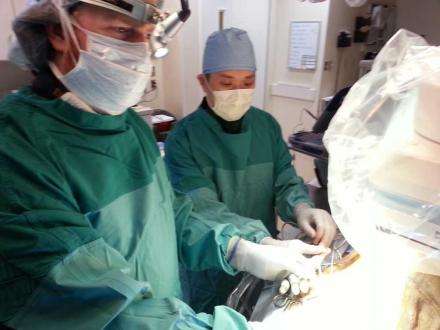Making diagnostic imaging possible for patients with cardiac implants

The University of Michigan Frankel Cardiovascular Center is on the forefront of making diagnostic imaging possible for patients with cardiac implants.
Electrophysiologist Eric D. Good, D.O., has implanted the state's first patient with BIOTRONIK's Iforia heart device. It's the only implantable cardioverter-defibrillator (ICD) approved for investigational use in magnetic resonance imaging (MRI).
The device is commercially available, but is in the newest phase of the ongoing ProMRI trial, a study that will examine ProMRI technology in the MRI environment.
"This technology is intended to allow full diagnostic capabilities for our patients who are likely to benefit from MRI scans," says Good. "We are very excited to be participating in the ProMRI trial."
Every year, more than 300,000 people are implanted with ICD systems to regulate their heartbeat, and studies estimate that 50 percent to 75 percent will need an MRI scan in their lifetime.
MRI scans often provide diagnostic capabilities for certain diseases or conditions that cannot be adequately examined by x-ray, computerized tomography (CT) or ultrasound.
The strong magnetic forces applied during MRIs can potentially have a negative effect on both the device and leads, and are usually not recommended for pacemaker and ICD patients.
"MRI is a safe and reliable diagnostic technology, and demand for imaging studies is growing," says Theofanie Mela, M.D., director of Pacer and ICD Clinic at Massachusetts General Hospital in Boston. "ICD patients are frequently recommended for MRI scans, but until now they have been unable to receive them."
The ICD ProMRI with exclusion zone study is designed to confirm the safety and efficacy of BIOTRONIK's Iforia ICD during an MRI scan. All the devices in the study are conditionally approved by the U.S. Food and Drug Administration for use in the study, but still await FDA approval for use in the MRI environment.
Aside from featuring ProMRItechnology, the single chamber Iforia series is one of the smallest ICDs in the world and also offers more than 11 years longevity. This allows for a low replacement rate—a benefit for both patients and the health care system.
The latest phase of the ProMRI clinical study will recruit and evaluate 172 patients at 35 U.S. investigational centers, including the University of Michigan Cardiovascular Center.
The U-M's Heart Rhythm Program focuses on the diagnosis and treatment of all types of arrhythmias, or abnormal heart rhythms, including atrial fibrillation and flutter, sick sinus syndrome, sinus tachycardia, sinus bradycardia, ventricular tachycardia and genetic arrhythmia syndromes such as prolonged QT syndrome.















